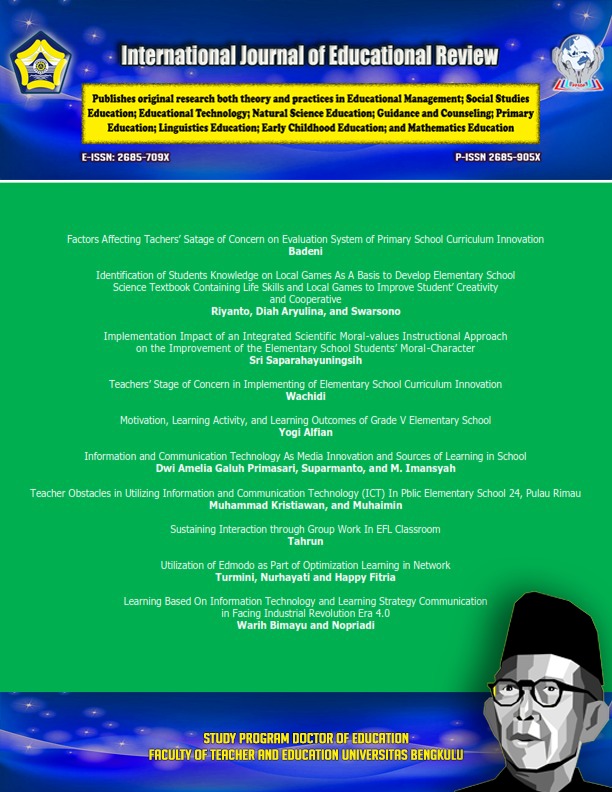Innovative Learning Processes in the Teaching of Accounts: Its Influence on Student’s Attitudes
DOI:
https://doi.org/10.33369/ijer.v5i1.29561Abstract
This paper focuses on the students’ attitudes towards the learning of accounts in vocational schools. The author aims to examine how innovative teaching and learning processes influence students’ attitudes towards accounts course. An explanatory survey method has been used to exploit and explain the data. The results of the study show that a teacher’s innovative teaching and learning process influences students’ attitudes towards the learning of accounts course. The learning of accounts is greatly influenced by the students’ attitudes which can be reshaped by the help of an innovative teaching-learning process. This means that innovative teaching is of positive impact in teaching accounts in vocational schools across Indonesia.
References
Ajzen, I. (1987). Attitudes, traits, and actions: Dispositional prediction of behavior in personality and social psychology. In Advances in experimental social psychology, Vol. 20 (pp. 1–63). Academic Press.
Ajzen, I. (2012). Values, Attitudes, and Behavior. In S. Salzborn, E. Davidov, & J. Reinecke (Eds.), Methods, Theories, and Empirical Applications in the Social Sciences (pp. 33–38). VS Verlag für Sozialwissenschaften.
Ajzen, I., & Fishbein, M. (1975). A Bayesian analysis of attribution processes. Psychological Bulletin, 82(2), 261–277.
Allport, G. W. (1937). Personality: A psychological interpretation (pp. xiv, 588). Holt.
Ansar, R., & Abubakar, K. (2022). Perceptions of Educating Accountants, Government Accountants, and Accounting Students on the Principles of the Indonesia Accountant Code of Ethics. 9(2).
Bageac, D., Furrer, O., & Reynaud, E. (2011). Management Students’ Attitudes Toward Business Ethics: A Comparison Between France and Romania. Journal of Business Ethics, 98(3), 391–406.
Bourn, D. (Ed.). (2020). The Bloomsbury Handbook of Global Education and Learning (1st ed.). Bloomsbury Publishing Plc.
Bucat, R. (2004). Pedagogical Content Knowledge as A Way Forward: Applied Research In Chemistry Education. Chemistry Education Research and Practice, 5(3), 215–228.
Cruickshank, D. R. (1990). Research that Informs Teachers and Teacher Educators. Phi Delta Kappa, 8th & Union Ave.
Elliot, A. J., & Dweck, C. S. (2005). Competence and Motivation: Competence as the Core of Achievement Motivation. In Handbook of competence and motivation (pp. 3–12). Guilford Publications.
Fredricks, A. J., & Dossett, D. L. (1983). Attitude–behavior relations: A comparison of the Fishbein-Ajzen and the Bentler-Speckart models. Journal of Personality and Social Psychology, 45(3), 501–512.
Gili Marbach-Ad. (2001). Student Attitudes and Recommendations on Active Learning: A Student-Led Survey Gauging Course Effectiveness | Request PDF. Journal of College Science Teaching, 30(7).
Hasan, S. H. (2012). Innovation to Improve the Quality of IPS Education. Seminar on IPS Education Social Studies Education Study Program at UPI Bandun Postgraduate Schoolg, 12.
Hooks, B. (2014). Teaching To Transgress (0 ed.). Routledge.
Ispir, O. A. (2010). Teachers’ burnout levels and their attitudes towards teaching profession. EABR & ETLC Conference Proceedings, 229–233.
Joni, T. R. (1984). General guidelines for teacher ability assessment tools. Jakarta: Director General of Higher Education, Ministry of Education and Culture.
Langer, E. J. (1993). A mindful education. Educational Psychologist, 28(1), 43–50.
Lyle M, Spencer, & Signe M. Spencer. (2006). Competence at Work: Models for Superior Performance. John Wiley & Sons.
Moch Idochi Anwar. (2004). Educational administration and management costs of education. Alfabeta.
Mulawarman, A. D. (2008). Purification of Accounting Education Episode Two: Hyper View of learning and its Implementation. TEMA, 9(1).
Nguyen, T. M., Phan, D., & Maheshwari, G. (2022). Perceived internationalization of accounting education: The case of Vietnam. Asian Review of Accounting, 31(1), 114–130.
R.S. Peters. (2010). The Concept of Education (International Library of the Philosophy of Education Volume 17). Routledge.
S. Hamid Hasan. (1996). Social science education. Academic Workforce Education Project.
Stephen Isaac & William B. Michael. (1981). Handbook in research and evaluation, Second Edition (Edits Pubs, Vol. 7). SAGE Publications.
Wulff, A. (Ed.). (2020). Grading Goal Four: Tensions, Threats, and Opportunities in the Sustainable Development Goal on Quality Education. BRILL.
Zakiah, S., & Ainiyah, Q. (2019). Teacher Personality Competence in the Book of Adab Al-'Alim Wa Al Muta'alim in the Perspective of Permendiknas No. 16 of 2007. Al-Idaroh: Jurnal Studi Manajemen Pendidikan Islam, 3(1).
Downloads
Published
How to Cite
Issue
Section
License

This work is licensed under a Creative Commons Attribution-ShareAlike 4.0 International License.




